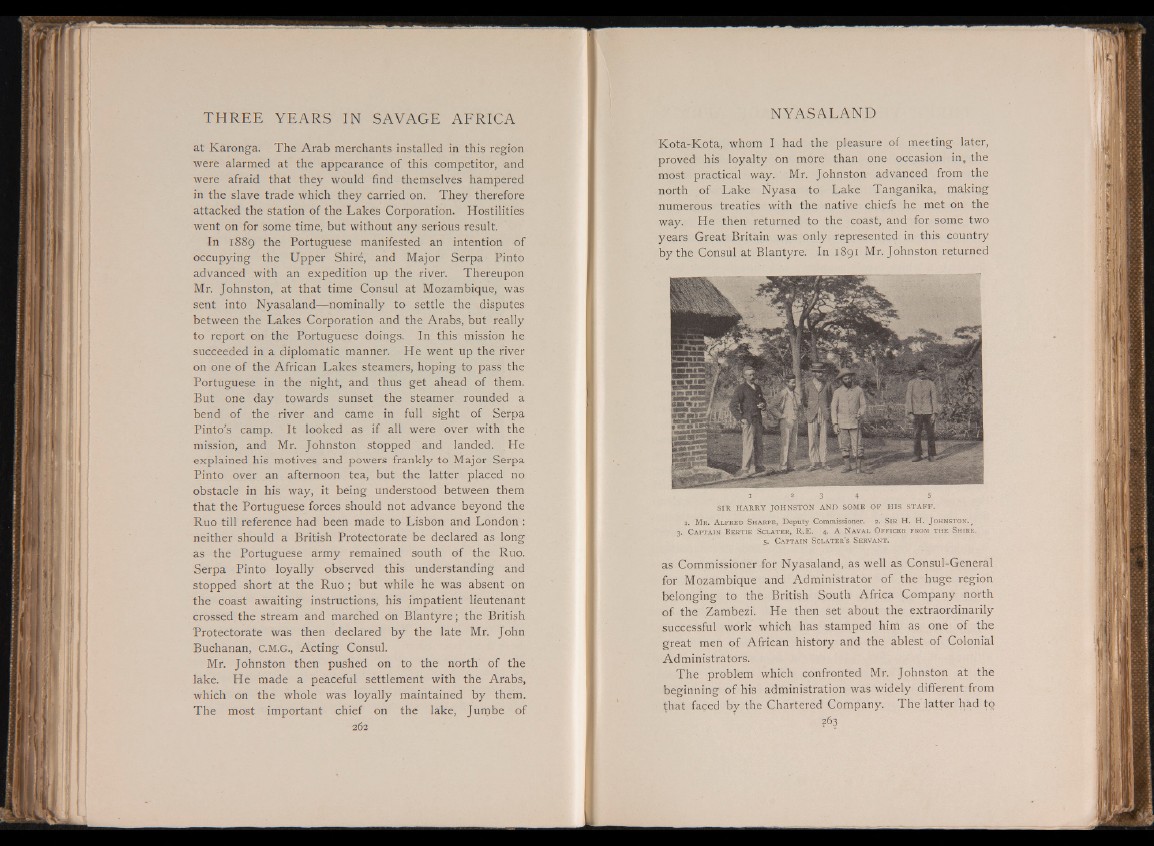
at Karonga. The Arab merchants installed in this region
were alarmed at the appearance of this competitor, and
were afraid that they would find themselves hampered
in the slave trade which they tarried on. They therefore
attacked the station of the Lakes Corporation. Hostilities
went on for some time, but without any serious result.
In 1889 the Portuguese manifested an intention of
occupying the Upper Shird, and Major Serpa Pinto
advanced with an expedition up the river. Thereupon
Mr. Johnston, at that time Consul at Mozambique, was
sent into Nyasaland—nominally to settle the disputes
between the Lakes Corporation and the Arabs, but really
to report on the Portuguese doings. In this mission he
succeeded in a diplomatic manner. He went up the river
on one of the African Lakes steamers, hoping to pass the
Portuguese in the night, and thus get ahead of them.
But one day towards sunset the steamer rounded a
bend of the river and came in full sight of Serpa
Pinto’s camp. It looked as if all were over with the
mission, and Mr. Johnston stopped and landed. He
explained his motives and powers frankly to Major Serpa
Pinto over an afternoon tea, but the latter placed no
obstacle in his way, it being understood between them
that the Portuguese forces should not advance beyond the
Ruo till reference had been made to Lisbon and London :
neither should a British Protectorate be declared as long
as the Portuguese army remained south of the Ruo.
Serpa Pinto loyally observed this understanding and
stopped short at the Ruo; but while he was absent on
the coast awaiting instructions, his impatient lieutenant
crossed the stream and marched on Blantyre; the British
Protectorate was then declared by the late Mr. John
Buchanan, C.M.G., Acting Consul.
Mr. Johnston then pushed on to the north of the
lake. He made a peaceful settlement with the Arabs,
which on the whole was loyally maintained by them.
The most important chief on the lake, Jumbe of
262
Kota-Kota, whom I had the pleasure of meeting later,
proved his loyalty on more than one occasion in, the
most practical way. Mr. Johnston advanced from the
north of Lake Nyasa to Lake Tanganika, making
numerous treaties with the native chiefs he met on the
way. He then returned to the coast, and for some two
years Great Britain was only represented in this country
by the Consul at Blantyre. In 1891 Mr. Johnston returned
i 2 3 4 5
S IR HARRY JOHNSTON AND SOME OF HIS STAFF .
i f M r . A l f r e d S h a r p e , Deputy Commissioner. 2. S ir H. H. J o h n s t o n .^
3. C a p t a in B e r t i e S c l a t e r , R .E . 4. A N a v a l O f f i c e r f r o m t h e S h i r e .
5. C a p t a in S c l a t e r ’s S e r v a n t .
as Commissioner for Nyasaland, as well as Consul-General
for Mozambique and Administrator of the huge region
belonging to the British South Africa Company north
of the Zambezi. He then set about the extraordinarily
successful work which has stamped him as one of the
great men of African history and the ablest of Colonial
Administrators.
The problem which confronted Mr. Johnston at the
beginning of his administration was widely different from
that faced by the Chartered Company. The latter had tq
2 6 3